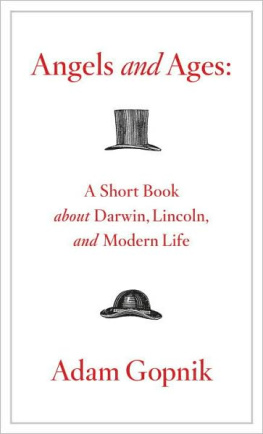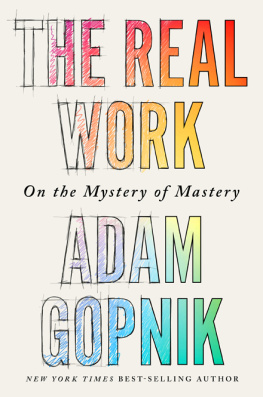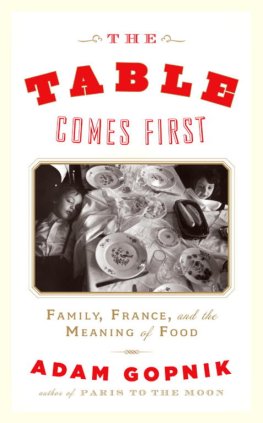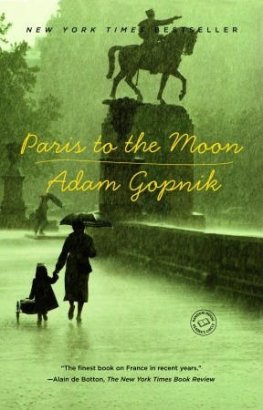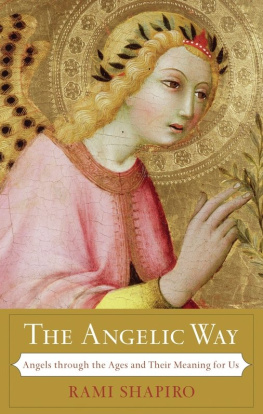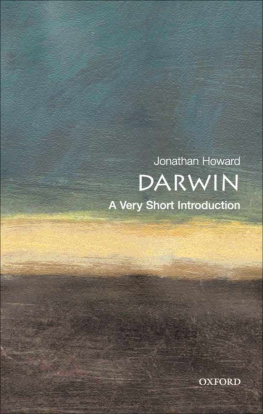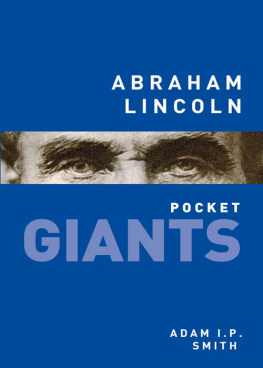Adam Gopnik - Angels and Ages: A Short Book About Darwin, Lincoln, and Modern Life
Here you can read online Adam Gopnik - Angels and Ages: A Short Book About Darwin, Lincoln, and Modern Life full text of the book (entire story) in english for free. Download pdf and epub, get meaning, cover and reviews about this ebook. year: 2009, publisher: Knopf Doubleday Publishing Group, genre: Religion. Description of the work, (preface) as well as reviews are available. Best literature library LitArk.com created for fans of good reading and offers a wide selection of genres:
Romance novel
Science fiction
Adventure
Detective
Science
History
Home and family
Prose
Art
Politics
Computer
Non-fiction
Religion
Business
Children
Humor
Choose a favorite category and find really read worthwhile books. Enjoy immersion in the world of imagination, feel the emotions of the characters or learn something new for yourself, make an fascinating discovery.
- Book:Angels and Ages: A Short Book About Darwin, Lincoln, and Modern Life
- Author:
- Publisher:Knopf Doubleday Publishing Group
- Genre:
- Year:2009
- Rating:5 / 5
- Favourites:Add to favourites
- Your mark:
- 100
- 1
- 2
- 3
- 4
- 5
Angels and Ages: A Short Book About Darwin, Lincoln, and Modern Life: summary, description and annotation
We offer to read an annotation, description, summary or preface (depends on what the author of the book "Angels and Ages: A Short Book About Darwin, Lincoln, and Modern Life" wrote himself). If you haven't found the necessary information about the book — write in the comments, we will try to find it.
Angels and Ages: A Short Book About Darwin, Lincoln, and Modern Life — read online for free the complete book (whole text) full work
Below is the text of the book, divided by pages. System saving the place of the last page read, allows you to conveniently read the book "Angels and Ages: A Short Book About Darwin, Lincoln, and Modern Life" online for free, without having to search again every time where you left off. Put a bookmark, and you can go to the page where you finished reading at any time.
Font size:
Interval:
Bookmark:
ALSO BY ADAM GOPNIK
Through the Children's Gate
Paris to the Moon
The King in the Window
Americans in Paris: A Literary Anthology (ed.)
High and Low: Modern Art and Popular Culture
(with Kirk Varnedoe)
Adam Gopnik has been writing for The New Yorker since 1986. He is a three- time winner of the National Magazine Award for Essays and for Criticism and the George Polk Award for Magazine Reporting. He lives in New York City with his wife and their two children.
Subsequent editions of the first Epistle [of the Essay on Man] exhibited two memorable corrections. At first, the poet and his friend Expatiate freely o'er this scene of man, A mighty maze of walks without a plan. For which he wrote afterwards A mighty maze, but not without a plan: for, if there were no plan, it was in vain to describe or to trace the maze.
Samuel Johnson, Life of Pope
Yes! said the fairy, solemnly, half to herself, as she closed the wonderful book. Folks say now that I can make beasts into men, by circumstance, and selection, and competition, and so forth. Well, perhaps they are right; and perhaps, again, they are wrong. That is one of the seven things which I am forbidden to tell, till the coming of the Cocq -cigrues; and, at all events, it is no concern of theirs. Whatever their ancestors were, men they are; and I advise them to behave as such, and act accordingly.
Charles Kingsley, The Water-Babies
Sciencescientific reasoningseems to me an instrument that will lag far, far behind. For look here, the earth has been thought to be flat. It was true, so it still is today, for instance, between Paris and Asnires. Which however does not prevent science from proving that the earth is principally round. Which no one contradicts nowadays.
But notwithstanding this they persist nowadays in believing that life is flat and runs from birth to death. However, life too is probably round, and very superior in expanse and capacity to the hemisphere we know at present.
Vincent van Gogh, June 1888
T ides and splashes, angels and agesheretical thoughts fill one's head at the end of a long walk through the past. Would the tides of history and ideas really have changed had neither man ever made a splash? Can we imagine modern life, and liberal civilization, just as well without either man?
Darwinism, after all, might have been achieved without Darwin, just as the North would most probably have won the Civil War, and slavery would have ended around the same time, without Lincoln. Alfred Wallace had the idea of natural selectionbut, as he knew perfectly well, he was not competent to write a book of the scale or persuasiveness of The Origin. He had none of the larger arguments, none of the crushing waves of evidence, none of the deeply meditated grasp of the difficulties. But weren't there other naturalists in touch with the larger evidence, and wasn't Huxley always there to shape the evidence into argument? Yes. Had it emerged that way, though, evolution by natural selection would have appeared only as a footnote, slowly infiltrating the general consciousness, exactly as Mendel's genetics did later. Without Darwin's craftily humble eloquence and exhaustive, encyclopedic evidence, evolutionary biology would never have carried the day so quickly. (And it did. Although the details of Darwin's views on adaptation and natural selection were not universally accepted until the neo- Darwinian synthesis of the 1940s, by the end of the nineteenth century his core point was already in place: in 1858, few people publicly believed that species were mutable; by 1900, essentially everyone did. The arguments, loud ones, were all about what it meant, and exactly how it happened, not whether it had.)
Character counts; eloquence illuminates. A useful comparison is to Charles's good friend Charles Babbage, who came as close to solving the problem of mechanical computation as Darwin did to solving the problem of the origin of species. Babbage's difference engines, the first programmable computers, could have ushered in a fin de sicle cybernetic revolution. But Babbage was, as Darwin tells us, a disappointed and discontented man; and his expression was often or generally morose. One day he told me that he had invented a plan by which all fires could be effectively stopped, but added,I shan't publish itdamn them all, let all their houses be burnt. (Babbage also once remarked, There is only one thing which I hate more than piety, and that is patriotism.) Darwin observed, correctly, that Babbage's bark was much worse than his bite, but his bark caused him to be seen, as the English say, as barkingnuts. And so the first computers would be left unfinished and largely unknown. Had Babbage been a writer and advocate as gifted as Darwin, and Darwin as much a maverick and a pill as Babbage, we might have had steam-driven art nouveaustyled personal computers in the early twentieth century, while evolutionary biology would have been left a murky mess until after the Second World War.
Without Darwin, no Darwinismbut might it perhaps, just perhaps, have been just as well? Had Darwinism not been Darwinism, it might have kicked up less ideological dust, some of which is surely noxious. Exasperated by the way specious arguments over evolution are sustained in the guise of personal arguments over Darwin, a few professional biologists, like Olivia Judson, have even undertaken to have the very word Darwinism replaced in discussion of his legacy. Darwinism is just what Darwin happened to say, they point out, while evolutionary biology is the science that grew out of it. As things stand, the argument goes, anti- evolutionists can obsess about Darwin's agnosticism, or his relationship to eugenics, as though these things had any meaning or impact on what goes on in biology today. The name, they argue, implies an undue cult relation between the maker and his theory. There is no more point in calling evolutionary biology Darwinism than in calling the theory of gravity Newtonism or that of relativity Einsteinism. Evolutionary biologists are rightly amused, or offended, when this or that pundit claims to have issues with Darwinian thinking, or to have found a hole in Darwinian logic. After all, would one publish the news that a pundit isn't satisfied with the theory of gravity, or doubts that the earth goes round the sun? Evolution is by now as well established by argument and evidence and reproducible experiment as any truth of physics or cosmology as well established a theory as any in the history of science. (Which means, of course, that it continues to be altered and amended. That's why they call it science, and a theory.)
Understandable professional exasperation aside, a change of name would be a mistake. Though evolutionary biology does exist today independent of, even far removed from, Darwin's personal example, Darwinism is more than a set of claims; it is an entire epoch in human thought and feeling. His habits of mind fairness, popular address, and the annealing of courage with tact are worth revering even if scientists abandon or revise half of his tenets. The power of his examplean appetite for seeing joined to a capacity for seeing past, a love of observation enabling a gift for rigorous inferencewould be right even if his ideas were wrong. It was Darwin's inductive eloquence that made evolutionary biology happen in the admirable way that it didthe patient, exhaustive piling up of instances from botany, evidence from geology, facts of embryology, all hard- won things that he had seen for himself-along with the ability to give the pile a significant shape. Someone else might have done all that. But no one else did.
Font size:
Interval:
Bookmark:
Similar books «Angels and Ages: A Short Book About Darwin, Lincoln, and Modern Life»
Look at similar books to Angels and Ages: A Short Book About Darwin, Lincoln, and Modern Life. We have selected literature similar in name and meaning in the hope of providing readers with more options to find new, interesting, not yet read works.
Discussion, reviews of the book Angels and Ages: A Short Book About Darwin, Lincoln, and Modern Life and just readers' own opinions. Leave your comments, write what you think about the work, its meaning or the main characters. Specify what exactly you liked and what you didn't like, and why you think so.

